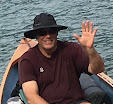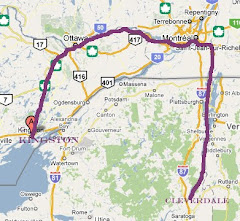 |
| Morning ritual - Coffee, Peaches and Breakfast Bars |
Sociologists and anthropologists tell us that rituals convey a lot about the beliefs and values of a culture, and a culture of sorts does emerge over the course of eighteen days of rowing. Throughout a journey of significant physical effort and strain, Brian quickly established and observed daily rituals that served as a kind of glue for our shared enterprise, rituals embedded in the consonant-rich acronym “CPBBCCC”. Sure, it doesn’t roll off the tongue unless you work for the government or are of eastern European descent. How about shortened to a graphically catchy CPBBCx3…or perhaps an algebraic CPBB{(3)C}? In longhand, it would read:
CoffeePeachesBreakfastBarCleanlinessCompartmentsCare.
Coffee. Nothing happened in the morning without coffee, Starbucks Via served in shallow, wide-brimmed, heat-conducting, lip-scalding aluminum cups. Brian brought along a cute ‘lil burner (“The Pocket Rocket” was voted MVP of all of our gear by the end of Week One) which had us caffeinated in no time each morning. I came to wonder how I had embarked on my earlier rowing journeys without one. As we finished each morning’s coffee we’d save a bit in our tins, look at each other over furrowed brows, rakishly backhand the remaining coffee into an imaginary fire, and say, “We’re burnin’ daylight” as we headed to the boats. Yes, John Wayne made his mark on us as youngsters.
Peaches. Brian loves peaches. I’ve known him for fifty years or so, and I never knew of this affection until I caught a glimpse of his food stores and discovered a material proportion of Georgia’s peach harvest tucked away in many, many itty-bitty cans. The peaches went with the coffee. A day without peaches was a day without sunshine…but not as bad as a day without coffee might have been. We ran out of peaches now and then and felt the absence when we did; we never ran out of coffee.
Breakfast Bars. This was the last of the culinary rituals. Breakfast bars became a kind of currency on the trip, and Brian dominated the exchange rate: he had many….I brought but a few. He knew of this imbalance yet each morning (after Day Six; it took that long to prompt and train him) he would ask, “You want a breakfast bar?”
Cleanliness. My dad was a POW in Germany during WW2 and related that a reliable sign of self-control, mental health, and discipline in the prison camp was one’s consistent attendance to cleanliness and personal hygiene. By this account, Brian would have made a better POW than I. He scoured his tent each morning with a Sham Wow while I was content to just blithely roll mine up, encapsulating whatever crumbs, garments, or carcasses of the insect population that bunked in with me the night before. I kept clean, folks, but I was not ready to pass inspection in the way Brian could have at any moment of every day. Why, he’d even stake his tent down every night. I, on the other hand, counted on my prodigious bulk to be sufficient ballast. And it was.
Compartments (aka “Fastidiousness”). After the coffee, the peaches, the breakfast bars, and the sanitizing of the tent came the packing…packing stuff for the day’s row and loading the boats for proper weight and balance. Brian’s capacity for neatness and organization expressed itself in his luggage and the methodical ritual of his packing. He brought sea bags for everything. His tent, inflatable mattress, and sleeping bag shared sanctuary in a single impressive sea bag, and each article found a specific and consistent home in a zippered compartment or waterproof cubby. As a result, when we’d push off each morning, his boat would carry a few neat bags impeccably and consistently arranged for balance and convenience, ready for a photo-op as the preferred attraction for lock visitors. My boat, on the other hand, looked more like that of a refugee or fugitive, loose items wrapped in plastic bags and smaller sacks distributed from bow to stern. If Brian had been swamped, he’d use his luggage as buoyancy bags and not lose a thing. If I’d capsized, well, just revisit the last ten minutes of “Titanic” for a visual.
 |
| Compare the shelves! |
Care. No matter how late in the day (or evening) we’d pull up…no matter how tranquil the waters or apparently safe the setting…no matter how tired he might be and how welcoming the prospect of rest, Brian always tended to his boat first. My Kevlar warhorse has long been accustomed to being ridden hard and put away wet, and it looks that way; if the line is secure and the gunwales and oarlocks are protected from wear, I’m ready for bed. Yet Brian’s end-of-day ritual with his beautiful cedar boat explains why it looks as new as it appeared ten years ago. The boat gets emptied of gear, gently pulled ashore, gingerly rotated to its inverted nesting position, and tied down ‘just in case’. To those of you who were a part of gifting this boat to Brian ten years ago, I can tell you that he’s taking care of it. Manic good care. Manic, I tell you.
You will note, Gentle Reader, that none of these rituals actually took place out on the water. The ritual of the campsite and of daily preparation was replaced each day by the individual effort of rowing. But the ritual of striking camp each day sated with coffee, peaches, breakfast bars, and well-packed gear set the tone for each day…and each day was good.
 |
| One guess as to who owns each boat! |

















No comments:
Post a Comment